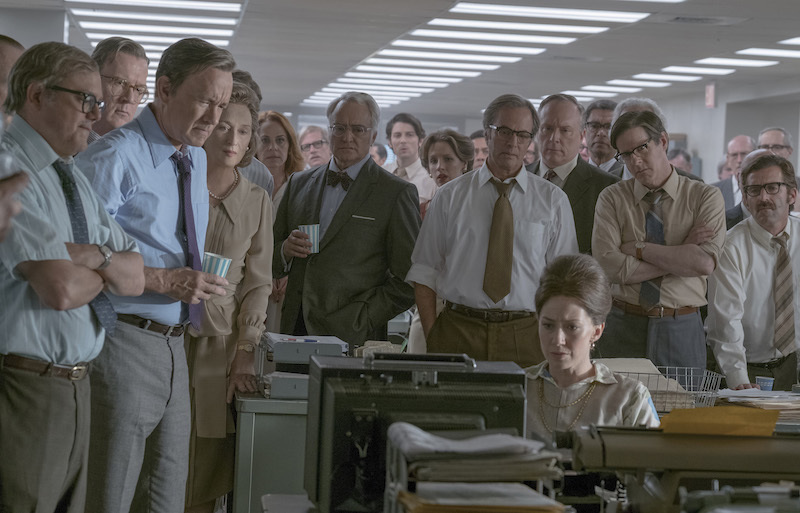
The Washington Post owner/publisher Katharine Graham was rather notably left out of All the President’s Men. In fact, I recently saw a tweet that compared scenes from the Alan J. Pakula classic to actual newsroom photos from the time, this time with Katharine “Kay” Graham quite clearly in the frame. So Steven Spielberg’s The Post, about The Washington Post’s historic decision to excerpt the Pentagon Papers, manages to work as both an homage to All the President’s Men and a corrective to it. In this film, Graham (played with wonderful nuance and intelligence by Meryl Streep) is front and center. Or to put it another way, in The Post, nobody puts Kay in the corner.
A bit of background. Before the Pentagon Papers were published, The Washington Post was far from the national powerhouse it is today. Editor Ben Bradlee (played with relish here by Tom Hanks) may’ve jealously followed the scoops and exclusives at The New York Times, but his paper wasn’t really in their league. It was a family paper, owned by Katharine’s father, who then turned over the reins to his son-in-law, Phil. Far from being insulted by this move, Katharine was proud of her husband. She was mostly content to host elaborate soirees in her home where major political operatives—including her good friend, Secretary of State Robert McNamara (Bruce Greenwood)—rubbed shoulders with D.C. socialites. But then her husband died—a suicide, although at one point in the film, Kay remarks that people tended to euphemistically call it “an accident”—and the paper became all hers.
When the film starts, The Washington Post is about to go public and Kay is meeting with her board to discuss the terms. She’s prepared—overly prepared, with both research and talking points—but when she gets into the boardroom—all men, who treat her like some sort of exotic bird—she clams up. Her friend, the Post’s CEO Fritz Beebe (Tracy Letts) has to step in and save her. The other boardmembers, including the exquisitely condescending Arthur Parsons (Bradley Whitford), think Kay is a lightweight.
The Post is ultimately about Kay finding her voice, finding her power, and coming to recognize that the newspaper business is in her blood—no one is more equipped to make decisions on the paper’s behalf than she is.
Of course, The Post is also a story about the Pentagon Papers, those top secret government documents which revealed that the White House had known the Vietnam War was unwinnable for years. The New York Times was the first to get their hands on them—Bradlee is driven to distraction, knowing that the Times is up to something big—but was then forced to stop publishing after a court order. Then, crack Post reporter Ben Bagdikian (Bob Odenkirk) tracks down the papers himself. From there, it’s a question of, to publish or not? Or in this case, will publishing lead to perishing? Bradlee, of course, is chomping at the bit to make this bold journalistic gambit. But for Kay, it’s much more complicated: The publication of the papers could quash the public offering, possibly land her and her editor in jail, and maybe even signal the beginning of the end for her family’s paper, not to mention alienate her D.C. insider friends.
It’s clear that Spielberg has been dying to direct a classic newspaper film for while. The Post is filled with images of newspaper men—and a couple of women, although one was a society reporter—hovering over typewriters and stacks of documents and TV screens; rushing pointedly through the newsroom while waving papers; and making stealthy phone calls to sources in empty alleys. And because the film is set in 1971, it’s got a grainy, ’70s-auteurist look, not to mention lots of sideburns, wide lapels, and polyester. It’s all very evocative of All the President’s Men.
The film is tons of fun but, as is Spielberg’s wont, it can be a little too on the nose. Kay is constantly walking into spaces where she’s literally the only woman—restaurants, boardrooms, courtrooms—it feels a bit over the top. In one scene, a hippie-ish war protester gives Kay an approving fist pump. Uh huh. And there’s a scene where Bradlee’s wife (Sarah Paulson) essentially STATES THE FILM’S THEME, explaining to her husband how much more is at stake for Kay and how hard it is to trust your intellect and instincts when you’re a woman who has always been told you’re lesser. Thanks for the crib notes, Steven!
But these are minor quibbles. Hanks is utterly winning as the gruffly charming Bradlee—the kind of old school newsman who calls underlings “kid” and rushes to the newsstand to see what his competition is up to. (There’s a wonderful scene where Bradlee and his staff grab the Times on a windy day and, as they feverishly flip through the paper, we watch the pages go flying to the wind.) And I’m running out of superlatives for Streep, but we should never take her excellence for granted. There’s a soon-to-be-famous scene where Kay is on the phone as competing voices fight to persuade her. We watch her face move from fretful to pensive and, finally, to determined. It really is one of those proverbial Master Classes in acting. Then again, Meryl Streep has been giving those for years.
